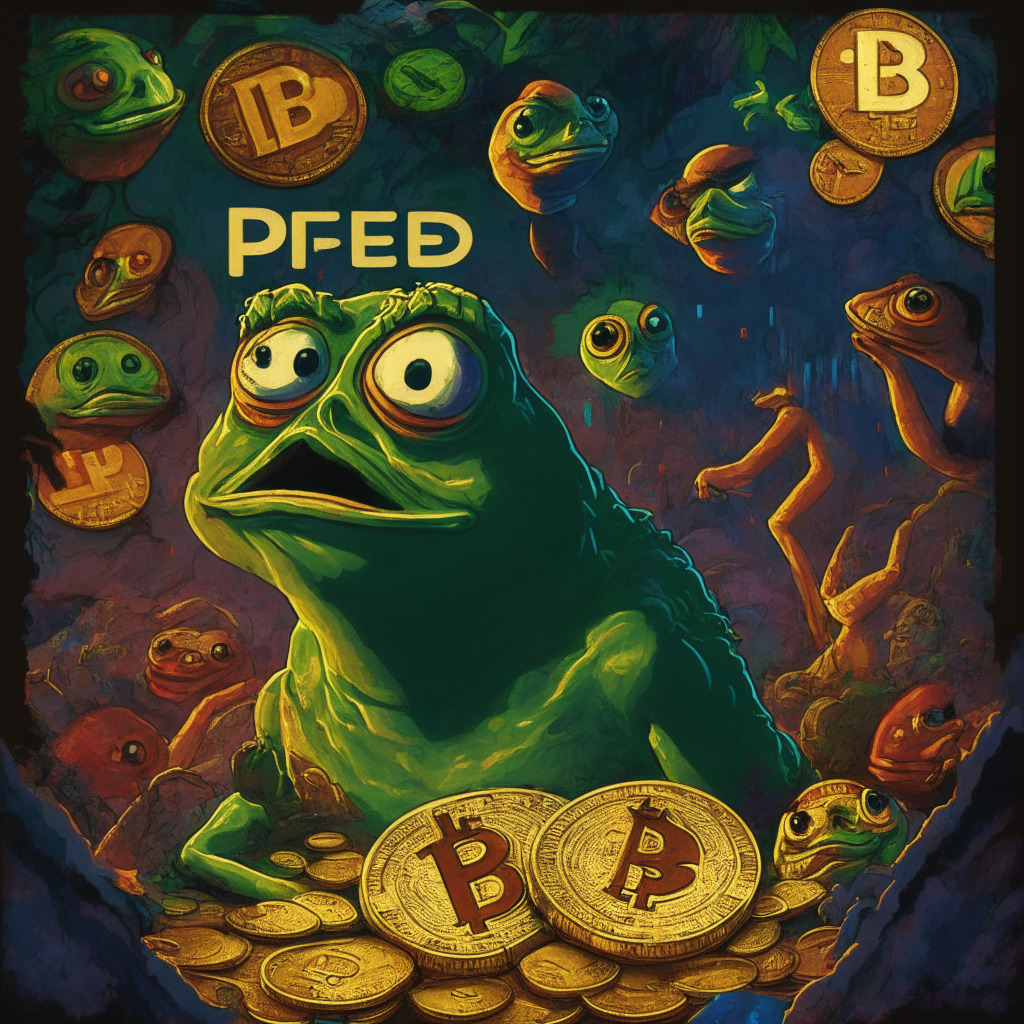“Mirae Asset Securities partners with Polygon Labs to promote Web3 tech adoption via tokenizing finance. The partnership seeks to overcome challenges such as steep learning curves and global regulatory disparities. The Mirae-led initiatives aim to foster interoperability between financial systems and propose a forward-thinking approach to digital finance.”
Search Results for: sand dollar
Dancing on Shifting Sands: Crypto Companies Adapt Amid Regulatory Obstacles and Market Developments
“The crypto industry is witnessing significant developments like Coinbase and Circle’s consortium dissolution, Binance.US’s collaboration with MoonPay, and customer withdrawal issues on the main Binance platform. These changes highlight the dynamic adaptations adaptive to changing regulations, representing both intriguing possibilities and cautionary tales for the industry.”
Billion-Dollar Meme Crypto: PEPE Token’s Unstoppable Rise and Dark Side
The PEPE token, a meme-inspired cryptocurrency, has surpassed a $1 billion market cap, sparking both hilarity and concern. Despite promoting a positive community, the token’s growing popularity has led to harassment, toxic behavior, and diehard commitment, challenging traditional perceptions of digital currencies.
Breaking Barriers: The Call for Greater Inclusivity and Regulatory Balance in the Crypto Space
MobileCoin CEO, Sara Drakeley, emphasizes the need for broader inclusivity, especially for women, in the crypto industry. She maintains that subtle changes could increase women’s participation in crypto, highlighting opportunities for balancing privacy, transparency, and inclusivity. Drakeley also discusses the growth of MobileCoin and anticipates significant shifts in crypto regulations.
Navigating Crypto’s Role in Political Fundraising: A New Dawn or Regulatory Nightmare?
The California Fair Political Practices Commission issued new rules for political aspirants accepting crypto donations, outlining specific procedures to ensure transparency and accountability. Crypto donations are becoming common in campaigns, though with stipulations around anonymous donors and exchange agreements. Regulations also cover advertising disclosures, contribution limits, and more.
The Bahamas to Disrupt Traditional Cross-Border Payments with USDC-Backed Wallet
“Island Pay, a Bahamian fintech firm, launches a digital wallet named CiNKO, leveraging the USDC stablecoin for financial inclusion. Unlike volatile cryptocurrencies, USDC provides stability, thereby reducing costs in cross-border transactions and greatly aiding the remittance landscape in Latin America.”
The IMF Report on Crypto Regulation in Latin America: Pros, Cons, and Ongoing Debates
The IMF report on Latin America and the Caribbean emphasizes varying approaches to crypto adoption, praising countries like Brazil and Argentina for fostering financial inclusion, while questioning the effectiveness of outright bans or restrictions on digital currencies.
IMF’s Global CBDC Platform: Navigating Interoperability and New Challenges in the Digital Age
The IMF is supporting the development of Central Bank Digital Currencies (CBDCs) and creating a global platform for interoperability between countries. With around 114 countries actively researching CBDCs, the IMF aims to facilitate efficient transactions while addressing challenges such as privacy, surveillance risks, and economic impacts.
Bank of England Inches Towards CBDC: Exploring Pros, Cons, and Privacy Concerns of Britcoin
The Bank of England and the BIS completed a yearlong project, Rosalind, exploring the practicality and potential benefits of a Central Bank Digital Currency (CBDC). Findings suggest CBDCs could expedite person-to-person payments, enable innovative financial products, and reduce fraud, paving the way for the Digital Pound, informally known as “Britcoin.”
eNaira’s First Year: Adoption Challenges, Competition with MMOs, and Remittance Solutions
Nigeria’s eNaira marks its first anniversary, with the IMF examining its performance and highlighting areas for improvement. Although praised as the second central bank digital currency (CBDC), slow adoption rates and delayed goals pose challenges. The IMF suggests innovative strategies and leveraging existing market networks to promote adoption and address remittance limitations.
Shocking $15M Crypto Scam Exposed: How Phishing Operation Mimicked HitBTC Exchange
A scammer or group used a sophisticated phishing method to steal approximately $15 million in cryptocurrency on a fake HitBTC exchange platform. The fake website gained unauthorized access to users’ holdings, compromising their assets. It is crucial to verify the browser’s URL to combat such attacks.
Pepe Coin’s Explosive Growth: Assessing Risks, Whale Dominance, and Futures Trading Impact
Pepe coin (PEPE) has seen astounding growth, appreciating by approximately 500% in two weeks. However, concerns about potential collapse due to dominant whale investors have led to increased short interest among futures traders, intensifying market risks and showcasing the importance of staying cautious in the volatile crypto world.
Meme Coins Rise, Crypto Giants Fall: Mixed Market Signals and the Brewing CBDC Political Storm
As the crypto market experiences mixed signals with meme coins surging and crypto giants faltering, political debates over Central Bank Digital Currencies (CBDCs) intensify. Florida and North Carolina vote to ban CBDCs, raising concerns about state-chartered banks’ autonomy and potential federal government overreach in money regulation.
Florida’s CBDC Ban Sets Stage for National Debate: How It Could Shape Crypto Industry’s Future
Regulatory developments impact the future of central bank digital currencies (CBDCs), with Florida’s recent ban revealing the evolving legislative landscape. Over 100 countries are researching CBDCs, which aim to digitize fiat currencies but face concerns regarding privacy and financial inclusion. Balancing potential benefits and risks before implementing laws is crucial for the growth of the crypto industry.
Gold Versus GambleFi: The Battle for a Safe Haven in Uncertain Economic Times
In the midst of global economic uncertainty, gold’s reliability shines while a gold token, XAUT, experiences a market rise implying a bullish sentiment. Emerging prospects like the TG.Casino, a GambleFi project, blending blockchain’s decentralised advantages with casino gaming, are gaining traction.
The Intricate Web of Illicit Fentanyl Trade Powered by Cryptocurrency
The U.S Treasury’s Office of Foreign Assets Control (OFAC) has targeted several cryptocurrency wallets involved in the illicit trade of fentanyl. Most transactions were conducted via Stablecoins on Ethereum and Tron networks. These wallets, save for one, were hosted on a centralized crypto exchange, allowing the illicit flow of hundreds of thousands of dollars worth of cryptocurrency.
JPEX DAO Conversion Controversy: User Asset Lock-Up Proposal Fuelling Further Turbulence
“Hong Kong-based cryptocurrency exchange JPEX is attempting to convert into a Decentralized Autonomous Organization (DAO), proposing to lock user assets for two years to transform into DAO Stakeholder dividends. However, this proposal has sparked criticism regarding non-consensual asset conversion and possible voting manipulations, questioning the exchange’s credibility.”
Crypto Scams and Increased Regulatory Scrutiny: A Double-Edged Sword for Investor Safety
The US Commodity Futures Trading Commission (CFTC) has cracked down on Mosaic Exchange Limited and its owner, Sean Michael, for fraudulent digital asset commodity practices. While regulatory bodies are stepping up their game against fraudulent cryptocurrency activities, the rise in ransomware and increased sophistication of crypto-crime highlight the need for vigilant investors.
Cryptocurrency Critic Senator Menendez Embroiled in Bribery Scandal: Irony or Reality?
“U.S. Senator Robert Menendez, known for his disapproval of cryptocurrencies like Bitcoin, ironically finds himself in a scandal involving traditional bribery means. He’s accused of accepting bribes, pointing out the contrast to his criticisms of crypto enabling criminal activities.”
The Green Shift: Bitcoin Leaps Towards Sustainability, Boosting Investor Interest
“A recent Bloomberg report suggests more than half of the power fuelling the Bitcoin ecosystem is sourced from renewable means, driving a movement towards sustainability within the crypto-verse. The trend towards greener practices could potentially attract institutional investor interest and inspire a sustainable crypto industry without sacrificing cash inflow.”
Battleground CBDC: A Bipartisan Struggle Shaping Cryptocurrency’s Future in the U.S.
The House Financial Services Committee introduced three bills halting the Federal Reserve’s considerations towards a Central Bank Digital Currency (CBDC). Republicans expressed fears over the potential impact on traditional banking and the suspense it could cast on the stablecoin market. Democrats, however, pushed for continued CBDC exploration, reminding of its potential benefits in global economic competition. The Federal Reserve reaffirmed its cautious approach towards CBDC, emphasizing concerns over a stablecoin issuance without federal control.
Balancing Privacy and Transparency: A Reshaping Future for Blockchain Regulations
Blockchain CEO Alex Svanevik discusses the challenge of balancing privacy and transparency within the blockchain sphere. Emphasizing that no protocol currently exists that fits perfectly on the scale, Svanevik predicts future blockchain projects will provide oscillating settings between transparency and privacy, based on situational requirements. These future protocols, he argues, should also be acceptable to regulators.
Paxos’s $500k Bitcoin Transfer Misstep: Critical Lessons for the Crypto World
Paxos, the company behind major stablecoins, has owned up to a significant Bitcoin transaction error, costing $500,000 in fees to move approximately $2,000 worth of Bitcoin. This seems to be a result of a bug causing overcompensation of the network fee. However, Paxos reassures users that their funds remain secure and unaffected. This incident emphasizes the need for continual refinement in payment systems to avoid such costly errors in the future.
Unveiling the Future: How Polygon’s $1 Billion Bet on ZK-Rollups Revolutionizes Blockchain Technology
Polygon co-founder Sandeep Nailwal believes strongly in the potential of zero-knowledge proof (ZK-proof) technology for Ethereum scaling, as evidenced by allocating $1 billion towards its development. Nailwal proposed a unified scalability system where recursive ZK-proof technology merges different blockchain ZK-proofs into a common layer, dramatically improving cross-chain transaction times.
Animoca Brands Raises $20M for Mocaverse Project: A Revolutionary Leap or a Risky Bet?
Animoca Brands raised $20 million in initial financing for its Web3-native tool project, ‘Mocaverse’. With this funding, the company aims to foster product development, enhance Web3 adoption, and establish strategic partnerships to enrich the gaming, culture, and entertainment ecosystem. However, the complexity and uncertainty of blockchain developments foster skepticism.
Implications of Cryptocurrency Inclusion in US Accounting Rules: The Triumphs & Tribulations
The adjustment to the FASB accounting rules extends fair value accounting to include cryptocurrency holdings, impacting all organizations that align with U.S. GAAP. This realignment redefines the understanding of discriminatory aspects like fair value, potentially encouraging more corporate adoption of crypto. However, the change also heightens the volatility risk in earnings.
A Tale of Blockchain Misdeeds: Nate Chastain’s Insider Trading & The OpenSea Scandal
“The conviction of Nate Chastain, ex-head of product at OpenSea, shines light on the importance of regulations in blockchain technology and decentralized finance. Found guilty of insider trading and money laundering, his case underscores the complexity of digital asset regulation and the emerging legal landscape of blockchain technology.”
Rollercoaster Crypto Week: SEC Clashes, Price Tumbles, and Emerging Global Acceptance
This week in the crypto world saw a tumultuous phase as the SEC continues its litigation against Ripple Labs, while Bitcoin and Ethereum prices took a plunge. However, there are signs of hope as the EU welcomes its first Bitcoin ETF, and Coinbase gets regulatory approval for offering Bitcoin and Ethereum futures contracts.
Crippling $1 Billion Crypto Liquidation: Markets in Turmoil, Caution Urged
“A sudden slump in Bitcoin and Ether prices caused a frenzy in the cryptocurrency market, leading to large-scale liquidations and a loss of estimated $1B. As per Coinglass, 176,752 traders got liquidated within 24 hours. Market volatility, macroeconomic conditions, and range-trading tendencies have contributed to this downturn. Despite potential rewards, the inherent risks underscore the need for thorough research before investing.”
HBAR Rises as FedNow Integrates Hedera’s Dropp: A Seismic Shift in Blockchain Landscape?
“Hedera Hashgraph’s digital token HBAR sees a value surge following its decentralized applications (dApps) Dropp’s listing by the US Federal Reserve’s payment service, FedNow. Dropp offers an affordable micropayments platform and infrastructure for the trending non-fungible token market, positioning Hedera’s applications on the brink of a significant shift in the blockchain technology landscape.”
Navigating Uncharted Waters: The Question of Crypto Regulation and Tax Evasion
Senators Elizabeth Warren and Bob Casey are urging strict enforcement of crypto reporting requirements within the Infrastructure Investment and Jobs Act (IIJA), suggesting clear tax reporting guidelines for digital asset “brokers”. This measure aims to close the $50 billion “crypto tax gap”, addressing the tax evasion in the crypto industry.
Closing the $50 billion Crypto Tax Gap: Urgent Measures or Rushed Consequences?
Democratic Senators, including Elizabeth Warren and Bernie Sanders, urged the IRS and the Treasury Department to expedite new crypto tax regulations to close a potential “$50 billion crypto tax gap.” They expressed concerns about potential loss of $1.5 billion in government tax revenue for 2024 due to delay in the implementation. This is amid a wider conversation for more transparency in the bourgeoning cryptocurrency sector.































